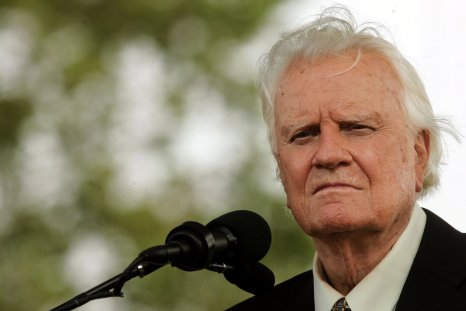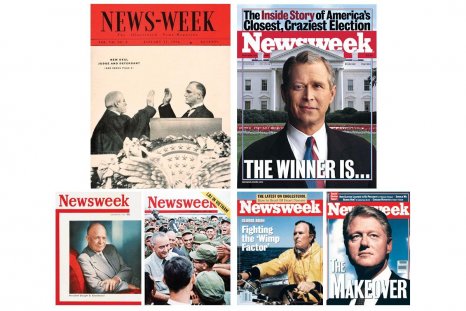Billy Graham in Twilight: A 2006 Profile of Evangelist
America's best-known Christian evangelist died has died at 99. Jon Meacham profiled profiled him in 2006.
The Power of the Cover
Former editor Jon Meacham on how telling the story of presidents and top pols has been a key 'Newsweek' mission.
Let Reformation Begin at Ground Zero
The debate over the Islamic center in lower Manhattan—the mosque with a pool and a prayer room—is not a matter of being for religious liberty and thus for the center, nor is it one of being against the center and therefore a bigot. Sometimes life offers such stark moral crises. This is not one of them.
Don't Wait for a Thank You, Mr. President
The Obama White House is now feeling the effects of an inescapable historical fact: presidents rarely enjoy prolonged popularity in real time. They just do not. In memory we recast reality and choose to think—wrongly—that the leaders we consider great were thought of in such terms in their own eras.
A Victory for Liberty in California
At the conclusion of the arguments in Perry v. Schwarzenegger in June—at issue was the constitutionality of the ban on gay marriage that California voters passed in 2008—the leading attorney for the state found himself in a bit of verbal jousting with the judge, Vaughn R. Walker. "The marital relationship is fundamental to the existence and survival of the race," said the lawyer, Charles J. Cooper. "Without the marital relationship, your honor, society would come to an end."
Mysteries and Thrillers We Love
A friend I thought I knew well startled me the other evening with a sweeping literary judgment that led me, for the first time, to question how much I truly understand him. The subject was mysteries and thrillers. "Oh, I can't stand books like that," he said, flatly, leaving no room for argument.
When the Facts Get in the Way
My family and I have spent most of July in Tennessee, which has put me in the position of being in touch with but not obsessed by the news cycle. (Though there is not really a cycle to news anymore. It is more of a treadmill.) My first glimmer of things comes from my e-mail, with its news alerts, and last week, inevitably, I found myself following the strange saga of Shirley Sherrod, a hitherto unknown employee of the Department of Agriculture.
John Kerry's Fulbright Moment
It had been, Sen. John Sparkman of Alabama said, a "rocky road." The year was 1968—one of those years that ranks with A.D. 33, 1066, and 1776 as an inarguable landmark—and the Senate Foreign Relations Committee had spent hours in executive session struggling with the Vietnam War. Sen. Albert Gore Sr. of Tennessee dismissed concerns that holding public debates about the war would be divisive and undercut America's chances of victory.
Meacham: The Queen's Foreign Policy
She is an unlikely emblem of the new. Queen Elizabeth II's chief public virtue, in fact, has long seemed to be her stability and sturdiness. In introducing her to the United Nations General Assembly last week, Secretary-General Ban Ki-moon said as much, referring to the British monarch as an "anchor for our age."
Meacham: The Right Kind of American Populism
The American economy is sputtering, and we are running out of options. Interest rates can't go any lower. Another burst of government spending—whether a good or bad idea—looks politically impossible. Is there anything that could protect us from the dangers of stagnation or a double dip?
Criticism in an Age of Disproportion
In case you missed it—which is unlikely if you are reading this—President Obama gave an Oval Office speech last Tuesday on the BP disaster in the Gulf of Mexico. Though the remarks were hardly the stuff of legend—Lincoln's ghost need not fear that the Address to the Nation of June 15, 2010, will replace Gettysburg in the American imagination—neither were they as bad as many commentators decided they were.
Primary Examples for Our Daughters
As the father of two formidable daughters (one is 5, the other 2, but they already seem formidable to me), I loved the splendid evening female candidates had last Tuesday in primaries from South Carolina to Arkansas to California. Leaving aside the politics of the winners, the returns ratified the cultural and political shift that took place in 2008, when Hillary Clinton and Sarah Palin played central roles.
What an Umpire Could Teach BP
A drama that played out last week in Detroit is that rarest of public moments: one in which everyone involved acted with grace, giving the country an example not only of sportsmanship but of how to conduct oneself in politics, in business, in journalism, and in daily life. Can BP's CEO and those most directly engaged in the spill and its implications move forward with the same candor and clarity?
The Price of Forgetting Soldiers' Sacrifices
Americans easily forget about war and soldiers' sacrifices because so few of us have any direct connection to those who are fighting now. The military has become another country, a place where a disproportionate number of disadvantaged young Americans go to find their way.
Trial, Error, and the Gulf of Mexico
Government is not the root of all evil; neither are corporations. But governments fail, and corporations fail. Look no farther than the Gulf of Mexico for evidence of the culpability and responsibility of both entities for an unfolding and spreading disaster.
What Happened to Obama's Armageddon?
Here is a wild proposition, one that many who obsessively follow politics did not expect to entertain before Memorial Day. What if Barack Obama is not a tone-deaf big spender who misread the public on large-scale government reform such as health care, but is, instead, what he has always been: a smart, steady, and unobtrusively savvy politician whose long-term bets (his first being winning the presidency itself) are well--considered?
National Debt Should Not Be Ignored
He did not like the question very much. Last Wednesday afternoon, at the Peter G. Peterson Foundation's summit on fiscal responsibility, I asked Peter Orszag, the director of the Office of Management and Budget, whether unemployment would have to rise even further for the country to see our long-term economic challenges as a true, rather than a theoretical, crisis.
We Must Remember Reality of War
When I was growing up, I was semi-addicted to the novels of Herman Wouk, particularly The Winds of War and War and Remembrance. They did not glamorize warfare, but they did humanize it.
Franklin Graham on His Pentagon Disinvitation
The Rev. Franklin Graham says the expression of his religious opinion of Islam isn't really that divisive.
In Search of a Fiscal Cure
How grave are the fiscal problems of the U.S.? Speakers, including President Bill Clinton and the co-chairs of the National Commission on Fiscal Responsibility and Reform, Erskine Bowles and Alan Simpson, discussed the dangers of America's long-term structural deficits at the 2010 Fiscal Summit: America's Challenge and a Way Forward, sponsored by the Peter G.
Religious Case for Separating Church and State
Here we go again. On April 15 a federal judge in Wisconsin ruled that the National Day of Prayer, slated for May 6, was unconstitutional. The usual voices have been heard rising in objection (Sarah Palin and Franklin Graham among them) and, proving yet again that President Obama is no radical, the administration announced its own plans to challenge the decision.
Atticus Finch and Benjamin Hooks
On a beautiful autumn morning in 2007, a small but important pageant of American history unfolded in the East Room of the White House. The occasion was a ceremony, hosted by President George W.
Anger on the Right, With Guns
The country is in a bad place at the moment. As Evan Thomas and Eve Conant report this week, we are seeing a disturbing number of threats against lawmakers, a grim manifestation of the inchoate political and cultural anger on the American right.
The New Book On Barack Obama
David Remnick, the editor of The New Yorker, is a journalist other journalists would like to hate. But in every craft—athletics, banking, politics, whatever—there are a few people of such skill that envy gives way to admiration, and one is left feeling not hostility but respect.
Politics and the Wheel of Fortune
Pat Sajak is somewhat better known than Boethius (and Vanna White surely is), but this being Holy Week for Christians, let us take a moment to consider the philosopher who defined the wheel of fortune long before the game show.
Michelle Obama Talks Obesity With Jon Meacham
The first lady on what it takes to battle obesity.
Bill Clinton Discusses His War Against Obesity
The former president on obesity at home and abroad.
Sex, Substance, and the Fate of Nations
You have to give American politics this much: it is not boring. In recent days, a New York Democratic congressman resigned amid allegations of sexual misconduct; the lawmaker denied the charges, though he did acknowledge the asexual groping of a male aide. "Now they are saying I groped a male staffer," former representative Eric Massa told Glenn Beck on Fox News. "Yeah, I did.

















